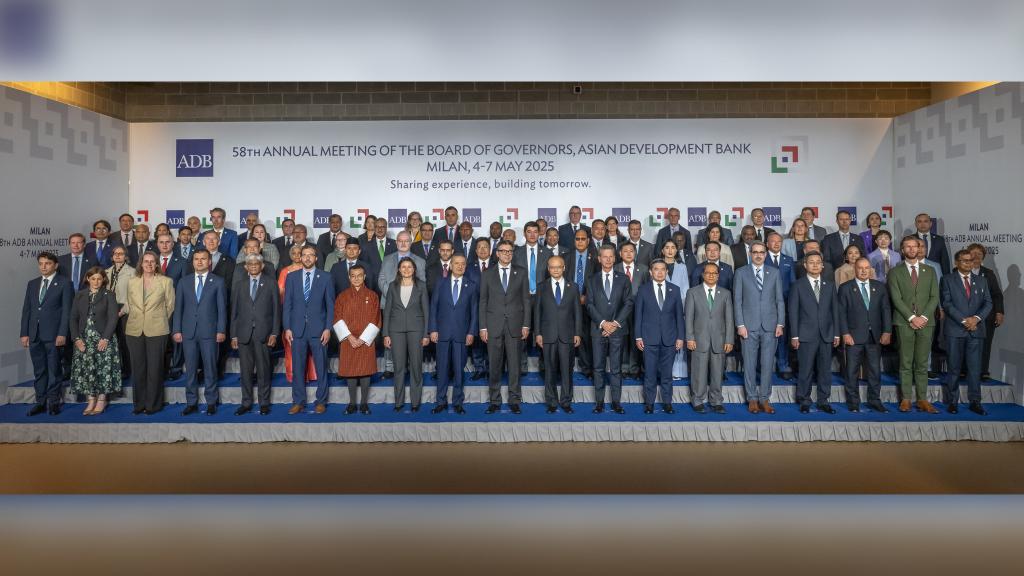ADB will scale up financing for food systems transformation to $40 billion by 2030; ADB President Calls for Collective Action to Solve Complex Challenges Together at 58th Annual Meeting of the ADB Board of Governors

FinTech BizNews Service
Mumbai, May 6, 2025: The uncertainties facing Asia and the Pacific are also an opportunity to build a more resilient and sustainable future, Asian Development Bank (ADB) President Masato Kanda said at the Opening Session of ADB’s 58th Annual Meeting of the Board of Governors.
“External shocks, debt burdens, and climate change weigh heavily on the people and economies of the region. But we are not starting from zero. Growth remains solid, trade and economic integration are deepening, supply chains are diversifying, and digital connectivity and innovation are accelerating,” said Mr. Kanda. “Uncertainty is not a reason for retreat. It is a call to be bolder, to move faster, and to work more closely than ever before.”
More than 5,000 participants joined the Annual Meeting in Milan, Italy consisting of representatives of governments—including Italian Prime Minister Giorgia Meloni—the private sector, civil society, and academia.
Italian Minister of Economy and Finance Giancarlo Giorgetti and Governor of the Bank of Italy and Chair of the ADB Board of Governors Fabio Panetta also spoke at the Opening Session, emphasizing Italy’s partnership with ADB.
“Enhanced collaboration will support higher and sustainable long-term economic growth, avoiding the materialization of downside risks and mitigating their possible consequences,” said Mr. Giorgetti. “As a leading multilateral development bank and trusted partner in Asia and the Pacific, ADB has been working to solve complex challenges together with its members and partners, both regional and nonregional.”
This year’s Annual Meeting highlights four focus areas that are central to driving transformational change across Asia and the Pacific.
First, to address the vulnerability of the region’s food systems, ADB will scale up financing for food systems transformation to $40 billion by 2030.
Second, ADB is investing in digital technologies to improve access to education, finance, and markets.
Third, ADB is investing in modernizing and connecting energy systems, including readiness to commit up to $10 billion to support work on the ASEAN Power Grid.
Fourth, ADB is deepening investments to build resilience by strengthening infrastructure, restoring and protecting ecosystems, and helping vulnerable communities adapt to the impacts of climate change.
ADB also reaffirmed its commitment to scale up private sector development, aiming to increase private sector financing four-fold to $13 billion annually by 2030.
ADB is a leading multilateral development bank supporting inclusive, resilient, and sustainable growth across Asia and the Pacific.
The Asian Development Bank (ADB) has announced plans to expand its support to long-term food and nutrition security in Asia and the Pacific by $26 billion, bringing its total funding for food security initiatives to $40 billion over 2022–2030.
The assistance will fund a comprehensive program spanning the entire food production process—from farming and processing—to distribution and consumption. Through financing and policy support for governments and companies, the program aims to help Asia and the Pacific generate diverse and nutritious food, create jobs, reduce environmental impacts, and promote resilient agricultural supply chains.
“Unprecedented droughts, floods, extreme heat, and degraded natural resources are undermining agricultural production, while at the same time threatening food security and rural livelihoods,” said ADB President Masato Kanda at ADB’s 58th Annual Meeting in Milan.
“This expanded support will help countries alleviate hunger, improve diets, and protect the natural environment, while providing opportunities for farmers and agribusinesses. It will drive change across the entire food value chain, from how food is grown and processed to how it is distributed and consumed.”
The new ambition builds on ADB’s September 2022 pledge to invest $14 billion by 2025 to improve food security and ease the regional food crisis. By the end of 2024, ADB had committed $11 billion—about 80% of the original allocation—with an additional $3.3 billion in investments programed for 2025.
The $26 billion in additional funding announced today will consist of $18.5 billion in direct ADB support for governments and $7.5 billion in private sector investments. By 2030, ADB aims for private sector investments to account for more than 27% of the total $40 billion program—underscoring the critical role of the private sector in driving food systems transformation.
More than half of the world’s undernourished people live in developing Asia. Biodiversity loss and malnutrition are straining food systems, which account for 70% of global water use, 50% of habitable land, and 80% of biodiversity loss. Food systems also employ 40% of the region’s workforce.
To support food systems transformation, the program will modernize agricultural value chains to improve access to affordable and healthy food for vulnerable populations. It will also invest in improving soil quality and conserving biodiversity-essential elements for productive agriculture that are increasingly under threat from climate change, pollution, and the loss of land and aquatic ecosystems. The program will support the development of digital technology and analytics to improve decision-making for farmers, agribusinesses, and policymakers.
ADB is establishing the Natural Capital Fund—a planned $150 million blended finance vehicle—with anchor support from the Global Environment Facility and contributions expected from other partners including the Global Agriculture and Food Security Program. This fund will support agri-food system projects by farmers and innovators that protect, restore, and manage natural capital sustainably across ADB’s developing members.
ADB is a leading multilateral development bank supporting inclusive, resilient, and sustainable growth across Asia and the Pacific. Working with its members and partners to solve complex challenges together, ADB harnesses innovative financial tools and strategic partnerships to transform lives, build quality infrastructure, and safeguard our planet. Founded in 1966, ADB is owned by 69 members—50 from the region.